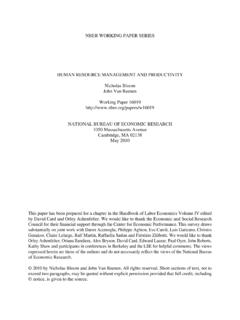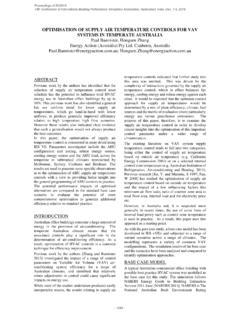Transcription of Management Matters in Australia - World …
1 Management Matters in Australia : Just how productive are we? Findings from the Australian Management Practices and Productivity global benchmarking project NOVEMBER 2009 Report commissioned by ISBN 978 0 642 72626 1 3 Professor Roy Green Dean, Faculty of Business University of Technology Sydney This unique research project for the Department of Innovation, Industry, Science and Research benchmarks Management practices in Australian manufacturing firms against the global best. The project was undertaken by a research team from the University of Technology Sydney, Macquarie Graduate School of Management and the Society of Knowledge Economics, and is part of a World -wide study led by the London School of Economics, Stanford University and McKinsey & Co.
2 The findings suggest that while some of our firms are as good as any in the World , we still have a substantial tail of firms that are mediocre, especially in their approach to people Management . This is a key differentiating factor between Australia and better performing, more innovative countries. The research also finds that there is a clear link between the quality of Management scored across 18 dimensions of people, performance and operations and enterprise productivity. Since the late 1990s, Australia s productivity performance has slipped from being one of the OECD leaders to a laggard.
3 This structural deterioration in our economy was masked in recent years by windfall gains from the commodities boom, which reversed the longstanding decline in our terms of trade and reduced the policy focus on Management and productivity. It is generally acknowledged that Australia has handled the World economic downturn well, overcoming our vulnerability as a small open economy with an effective fiscal stimulus package. However, this study suggests that it may now be appropriate to link these short-term measures to the need to build longer-term competitive advantage through targeted, supportive public policy initiatives.
4 The study demonstrates that a cost-effective way of improving the productivity performance of Australian firms is to promote a transformation in the calibre of the Management and leadership of our organisations. This is the key to a more innovative, dynamic and sustainable economy into the future. 4 CONTENTS Executive summary 5 Inside the productivity black box 10 Economic impact of Management practices 13 Australian managers perform around the global average 14 Drilling down into Australian Management 21 Issues for Australian manufacturing enterprises 30 Why do Australian Management practices vary?
5 32 Key implications for Australia 38 Australian Management Practices Research Team 42 5 Executive Summary This report reviews Management practices in Australian manufacturing firms and the link between these practices and the productivity performance of firms. The Australian Government s recent innovation white paper, Powering Ideas An Innovation Agenda for the 21st Century, recognises that the improvement of Australia s productivity performance will depend ultimately on the innovation capacity and performance of firms and organisations. The white paper contends that Australia s innovation system will need to work better if we want to maintain the way of life we value so much , and notes the implication that: One future focus of the Australian Government s industry and innovation policies will be on building innovation capacity and performance at the enterprise level.
6 However, policies to build innovation capacity and performance require an evidence base, and it has become apparent that there is little reliable data in Australia on Management practices and their relationship to firm performance. A major international study undertaken recently by the London School of Economics (LSE) and McKinsey & Co examined Management skills and capabilities across 15 countries and found clear linkages between the quality of Management and the performance of firms and organisations, but this study did not include Australia . There has not been any such analysis on a comparable scale in Australia since the comprehensive 1995 Karpin Report on leadership and Management skills, Enterprising Nation, and an earlier series of Australian workplace employment relations surveys, which is why the current study was commissioned to replicate the LSE methodology in Australia .
7 The key objective of the research is to identify determinants of high performance and to benchmark Australian firms against the global best. It is designed to provide an information base for policy development and services to improve innovation skills and workplace capabilities, including Management and leadership skills building on Enterprise Connect and the Education Revolution . How Australian Management rates This report is based on the results of a qualitative survey of 439 medium and large-sized1 Our study found that while Australian Management practices are not in the top rank of performance worldwide, they are also not among the worst.
8 They currently rate as only moderately above average when benchmarked globally, leaving significant scope for consistent and sustained improvement across key areas. The research also shows that the manufacturing firms in Australia , with an extension to a smaller sample of services firms. These firms were contacted in early 2009 and taken through a structured conversational interview to examine their Management practices across eighteen different dimensions, corresponding to three categories of Management capability: people, performance and operations. 1 LSE defines medium firms 100 to 5000 employees, Australian Bureau of Statistics (ABS) define small firms as firm size less than 20 employees, medium size firms from 20 to 199 employees, and large size firms with employees 200 and greater.
9 The small size firms in Australia are not in scope. 6 quality of Management practices has a measurable impact on labour productivity, as well as sales and the number of employees in firms. As a result, a single point increase in the Management score a measurement derived from the 18 Management characteristics in our scoring grid is associated with an increase in output equivalent to a 56% increase in the labour force or a 44% increase in invested capital. The study also found that there is considerable variance in Management practices within Australian firms. The following are the key findings with regard to the determinants of Management practices.
10 Size is an important factor in Management performance, with larger firms scoring better than smaller firms Ownership is also a factor and multinationals clearly outperform domestic firms in Management performance Australian publicly listed companies are also more likely to adopt modern Management practices than other types of company ownerships Family run businesses tend to exhibit inferior Management performance International exposure is important as there is a significant positive correlation between the Management score and share of exports The level of education and skills among both Management and non- Management






